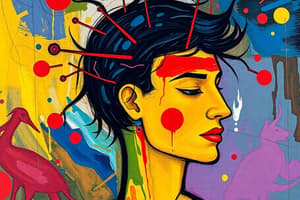Podcast
Questions and Answers
What does the term 'dementia praecox' refer to in the context of schizophrenia?
What does the term 'dementia praecox' refer to in the context of schizophrenia?
- A term coined by Emil Kraepelin to describe a condition now known as schizophrenia (correct)
- A form of autism related to impaired social interactions
- A psychiatric disorder characterized solely by memory loss
- An early-onset form of multiple personality disorder
Which of the following describes 'neologism' in the context of disorganized speech symptoms?
Which of the following describes 'neologism' in the context of disorganized speech symptoms?
- A tendency to repeat phrases or behaviors
- The creation of new words that may have meaning to the individual (correct)
- Randomly changing topics without coherence
- A form of mutism accompanied by gesturing
What is a characteristic of 'clang association' in speech?
What is a characteristic of 'clang association' in speech?
- A coherent response to questions
- A prolonged focus on a single topic
- Speech that is influenced by rhythm or rhyme (correct)
- The usage of complex technical jargon
Which symptom is NOT classified as a positive symptom of schizophrenia?
Which symptom is NOT classified as a positive symptom of schizophrenia?
Which of the following describes 'catatonia' as it relates to schizophrenia?
Which of the following describes 'catatonia' as it relates to schizophrenia?
What is 'associality' in the context of negative symptoms of schizophrenia?
What is 'associality' in the context of negative symptoms of schizophrenia?
According to Schneider, what are considered 'first rank symptoms' of schizophrenia?
According to Schneider, what are considered 'first rank symptoms' of schizophrenia?
What distinguishes schizophrenia from a brief psychotic disorder?
What distinguishes schizophrenia from a brief psychotic disorder?
Flashcards are hidden until you start studying
Study Notes
History of Schizophrenia
- Emil Kraepelin coined the term "dementia praecox" to describe the deteriorating mental state of individuals with schizophrenia.
- Eugene Bleuler later renamed the condition "schizophrenia," emphasizing the "splitting of the mind." He identified four fundamental symptoms:
- Blunt Affect: Inability to express emotions appropriately.
- Disturbance of Association: Fragmented thinking and difficulty connecting ideas.
- Autism: Withdrawal from social interactions and focusing on internal thoughts.
- Ambivalence: Conflict and inconsistency in emotional responses.
Schizophrenia Symptoms
- Positive symptoms are additions to normal behavior and include delusions, hallucinations, and abnormal movements.
- Negative symptoms are a reduction in normal behavior and include:
- Avolition: Lack of motivation and goal-directed behavior.
- Alogia: Reduced speech output.
- Anhedonia: Inability to experience pleasure.
- Associality: Lack of interest in social interaction.
Disorganized Thinking
- Tangentiality: A pattern of speech where responses drift away from the original question.
- Perseveration: Repeating the same word or phrase despite the conversation moving on.
- Neologism: Creating new words or phrases with no recognized meanings.
- Clang Association: Speech that is linked by rhyming or similar-sounding words, not logical connections.
Catatonia
- Stupor: Complete lack of psychomotor activity.
- Catalepsy: Maintaining a fixed posture for extended periods.
- Mannerism: Unusual movements or gestures that are odd or repetitive.
- Negativism: Resistance or lack of response to instructions or stimuli.
- Mutism: Inability or refusal to speak.
- Stereotypy: Repetitive, purposeless movements.
- Echolalia: Repeating another person's words or phrases.
- Echopraxia: Mimicking another person's movements.
Schizophrenia vs Psychosis
- Psychosis: A broad term referring to a mental state marked by a loss of contact with reality, often including hallucinations and delusions.
- Schizophrenia: A specific type of psychosis characterized by persistent psychotic symptoms for at least six months.
Brief Psychotic Disorder
- A diagnosis given to individuals experiencing psychotic symptoms for at least one day but less than one month.
Delusions
- Persecutory Delusions: Belief that one is being harmed or threatened.
- Erotomanic Delusions: Belief that another person is in love with them.
Studying That Suits You
Use AI to generate personalized quizzes and flashcards to suit your learning preferences.



